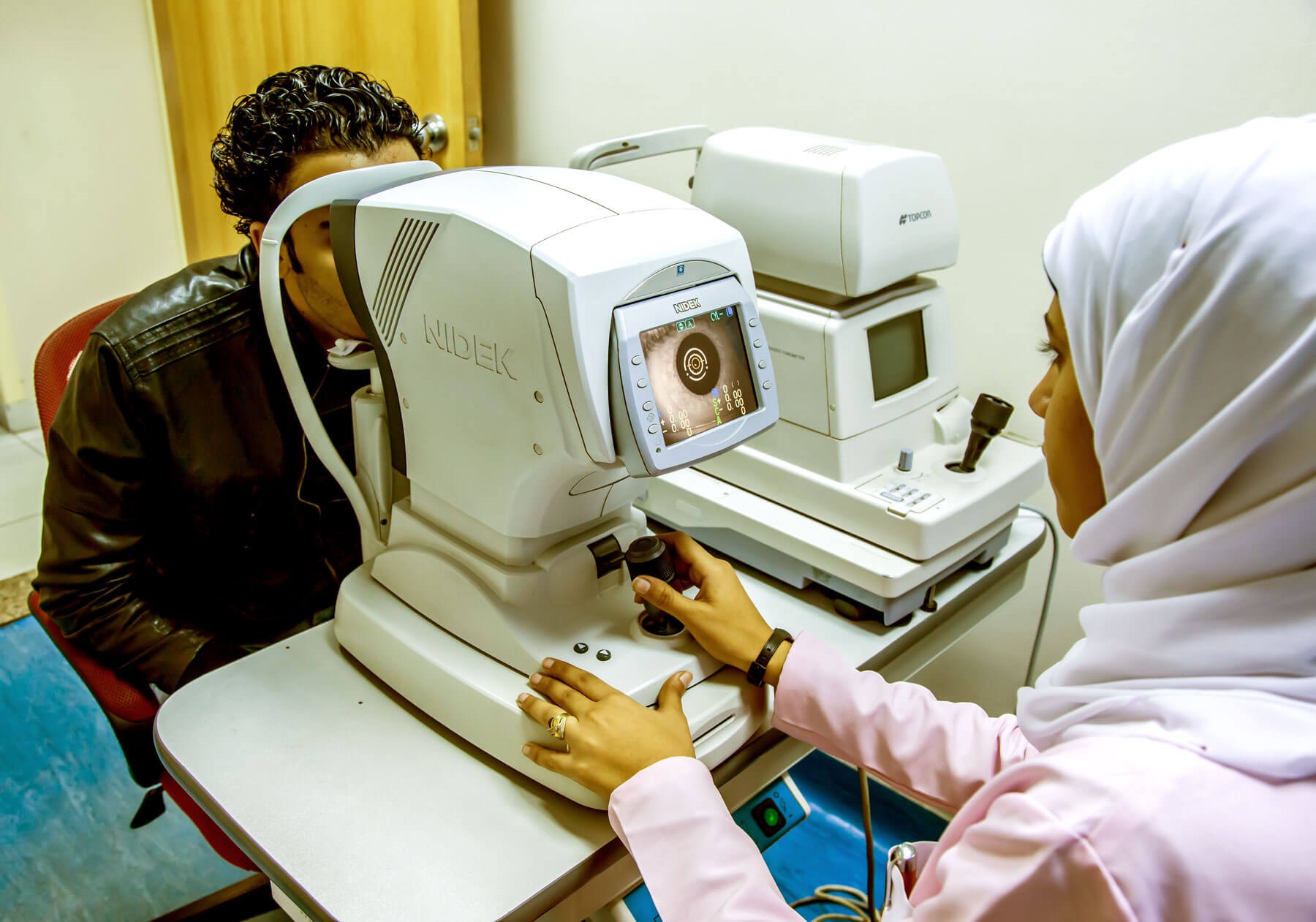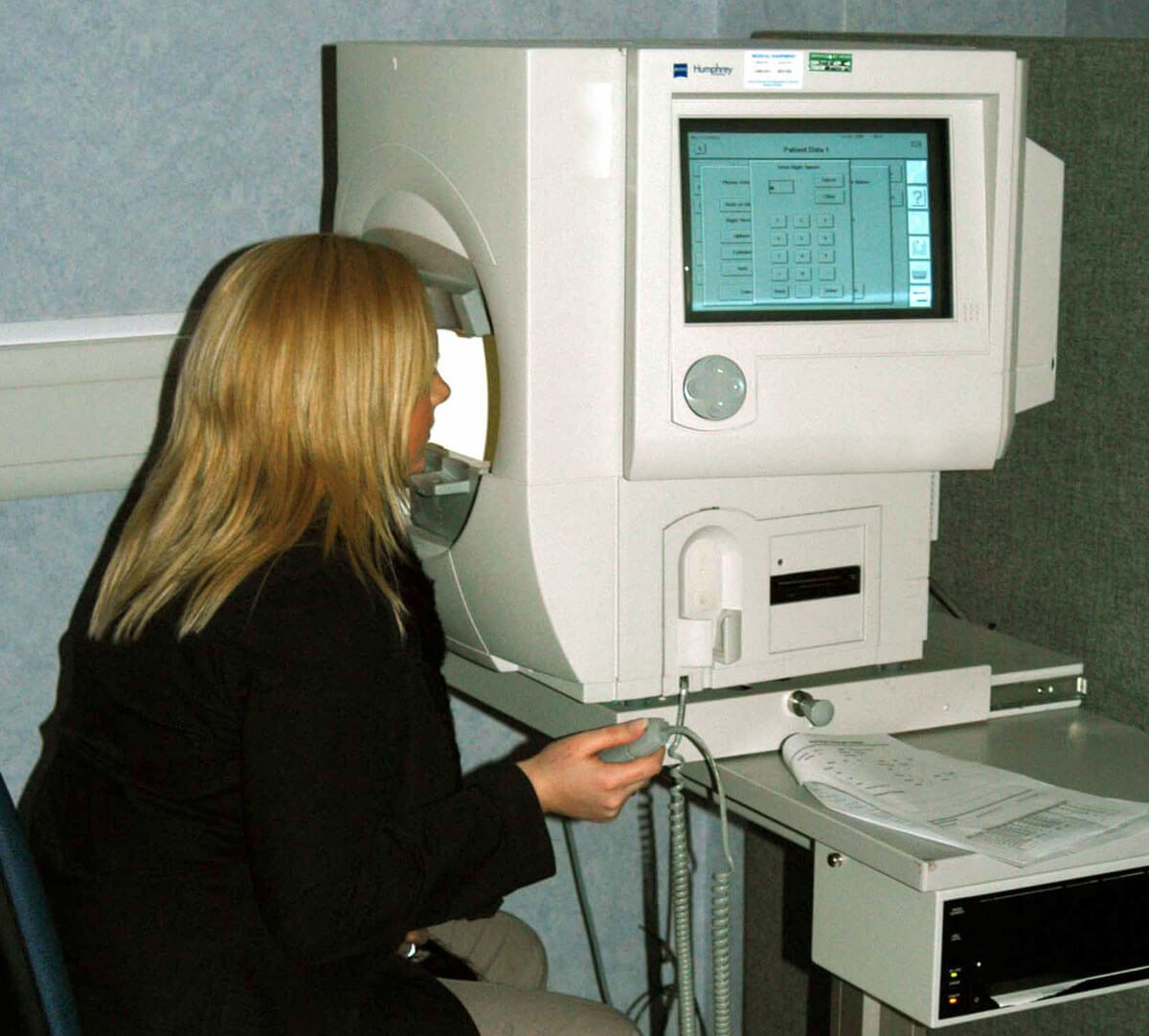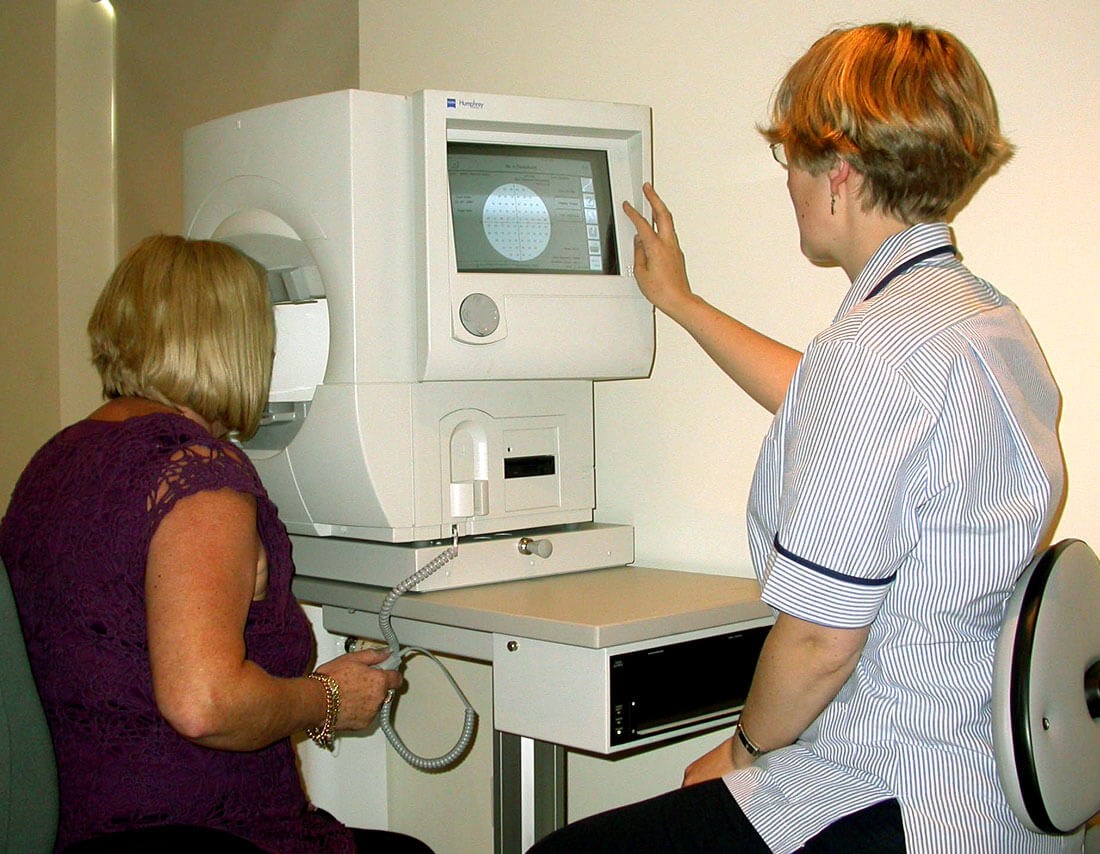
Introduction
The Association of Health Professions in Ophthalmology (AHPO) is a charity, whose objectives are to promote the practice, education, training and research in ophthalmology and vision science in the UK.
The extraordinary developments in diagnostic equipment and technologies have enabled the investigation and treatment of previously blinding diseases, such as age-related macular degeneration, but the education and training of ophthalmic staff who undertake diagnostic tests is frequently limited and variable. The main focus of AHPO’s work has been the development of training programmes and qualifications to foster their knowledge, skills and career development.

Ophthalmic Technician conducting pachymetry.
Ophthalmic and Vision Science is one of more than 40 NHS healthcare science specialties, and staff who undertake diagnostic tests are part of the Healthcare Science workforce [1]. Apprenticeships have been introduced for:
- Level 2: Healthcare Science Assistants
- Level 4: Healthcare Science Associates
- Level 6: Healthcare Science Practitioners [2].
The apprenticeships include academic qualifications, such as:
- Level 2: BTEC Diploma, equivalent to GCSE / AS level
- Level 4: BTEC Diploma, equivalent to Year 1 of BSc
- Level 6: BSc Degree Apprenticeship [3].
Apprenticeships are paid by the government from the apprenticeship levy, a 0.5% tax on large employers’ salary bills. Alternatively, employers can pay providers from their own budgets to deliver BTEC diplomas without the apprenticeship. On completion of training, apprentices undertake an end-point assessment (EPA) conducted by an independent body [4].
In 2019, AHPO became a registered independent training organisation and commenced delivery of the Level 4 Apprenticeship and BTEC Diploma [5,6]. Delivery of the BTEC Diploma is subject to continual external verification by Pearson, the awarding body, and we have consistently received excellent reports. All our apprentices passed the apprenticeship EPA on their first attempt. Yet in March this year, Ofsted graded us as ‘inadequate’, and the Department for Education terminated our apprenticeship delivery. How did we get to this point and what are the implications for the future of ophthalmic staff training?
How was the Ofsted inspection conducted?
The inspectors were given contact details of our apprentices and their mentors, and access to the apprentices’ portfolios, our eBooks, and BTEC external verification reports. They spent three days on our premises; they did not visit any workplaces, and communicated with apprentices, assessors, mentors and senior ophthalmic staff (other than myself) by telephone or Teams meetings, which I had no opportunity to observe. The Ofsted report states [7]:
- “Most apprentices enjoy their learning. They recognise the value of the resources they have been given to help them to study”.
- “Although apprentices are successful at end-point assessment, this is due to their extensive experience prior to them starting the apprenticeship.”
- “Apprentices do not develop substantial new knowledge, skills and behaviours as many have worked in the sector as ophthalmic technicians for more than 5 years. The knowledge that they do acquire is not sufficient to claim public funds for an apprenticeship and is more akin to continuous professional development (CPD) activities that should be funded by their employer.”
- “Apprentices do not receive any teaching as part of their apprenticeship, and they learn very little. Apprentices are provided with learning resources to study, and they subsequently pass due to their extensive experience and knowledge of the sector”.
Apprenticeships are delivered according to an Apprenticeship Standard, that is agreed by employers and relevant professionals, and approved by the Institute for Apprenticeships and Technical Education. The Level 4 Apprenticeship Standard outlines the required knowledge and skills that are incorporated into the BTEC Diploma [5,8]. These can be summarised in the following categories:
- Mandatory knowledge comprises about a third of the diploma. Ophthalmic technicians have experience in areas such as health and safety, safeguarding, and confidentiality, but not to the depth required for level 4. They have limited experience in developing standard operating procedures, the quality assurance of test results, audit and innovation, leadership and teamwork, and teaching and assessing practical skills.
- Underpinning knowledge comprises about half of the diploma and includes general and ophthalmic-specific anatomy, physiology and pathophysiology, epidemiology and public health, and ophthalmic pharmacology. Ophthalmic technicians generally have limited knowledge of these subjects.
- Ophthalmic skills comprise about a fifth of the diploma. Ophthalmic technicians perform diagnostic tests under direct or indirect supervision. An associate at level 4 requires minimal supervision and knows how to identify artifacts and ensure the quality of the test result, how to adjust test strategies or undertake an alternative test if needed, and how to identify ‘red flag’ test results and report these to senior staff.
AHPO courses are delivered with blended learning. We use an ePortfolio that contains detailed assessment plans and learning resources, and we provide a curated series of 13 eBooks on a tablet that serves as a portable reference library. Learners are supported by AHPO-appointed assessors who grade coursework and provide feedback on a weekly basis, and visit workplaces to assess performance of ophthalmic skills. Our delivery is consistent with the Apprenticeship Funding Rules that state: “Active learning does not need to be face-to-face delivery by the training provider […] The mode of delivery may include 1:1 instruction, cohort attendance at the training provider, virtual classrooms or self-directed distance learning” [9].
The Ofsted report states that we failed to teach, and that our apprentices succeeded because they already possessed the required knowledge and skills. We were surprised that the inspectors, who had no ophthalmic expertise, determined this by phoning up apprentices – none of whom had completed the apprenticeship – and asked questions such as, “Tell me what you learnt in an eBook” [10]. It seems improbable that apprentices who had nothing new to learn would tell the inspectors that they enjoyed their learning and valued the resources they were given [7]. There is documentation in the portfolios of work that had to be resubmitted, and reflective accounts in which learners have documented the knowledge they have gained. All the feedback we have received from learners is available on our website and confirms that they value the knowledge they have acquired [11].
We received a communication (redacted below) from a mentor who was interviewed by the inspectors: “Having read the Ofsted report, I am quite shocked at how this has been interpreted, and actually would challenge some of the accuracy to what our actual responses were. The apprenticeship our two ophthalmic technicians have gone on has been most beneficial, in terms of their own professional development, the department, and most importantly, the patient service.
“Apprentices have developed their leadership and management skills throughout the apprenticeship, and taken an active lead in teaching and education of new skills for the ophthalmic technicians. Having recently gone through supervised practice observations modules, I can certify that this course has helped them understand the tasks they were previously performing and were both able to illustrate this knowledge through oral questioning, which has been documented in the direct observation templates” [11].

Ophthalmic Technician conducting visual field tests.
Implications of the Ofsted inspection for eye service delivery
Patients are losing their sight as a consequence of delays in eye outpatient appointments [12,13]. The Royal College of Ophthalmologists published a report, ‘RCOphth response to Public Accounts Committee Inquiry Managing NHS backlogs and waiting’ [14] which concludes: “30. [Technicians] can be quickly trained and deployed […], increasing efficiency and reducing the demands on ophthalmologists – freeing them up to undertake more surgeries, and deal with more complex cases. Therefore, relatively small investments in expanding the non-graduate […] workforce, for deployment in efficient new ways of working […] is an effective measure to tackle both outpatient and surgical backlogs” [14].
In a study of glaucoma virtual clinics ophthalmic technicians were interviewed and expressed concerns about the insufficiency of their training [15]: “I would welcome a lot more training and a lot more understanding of the conditions of glaucoma. We’re not given as much information as is available and it would help us to know whether or not the tests we’re performing are of sufficient quality (OSP / OT 9).”
It is noteworthy that the apprenticeship would have addressed their concerns and would also have provided them with the skills to become team leaders who could train and supervise new members of the team.
It can be difficult for people unfamiliar with ophthalmic practice to appreciate how much a technician needs to know about the structure / function of the eye, in order to do their job safely and effectively. All the devices used for clinical decision-making – including optical coherence tomography – are imperfect, and the data sometimes contains errors and artifacts [16,17]. Patients will suffer the consequences of clinical decisions based on poor quality tests, but it is the ophthalmologist and not the inadequately trained technician who is accountable.

Ophthalmic Technician conducting visual field tests.
Conclusion
The standard for the apprenticeship and the course specification for the BTEC Diploma have been set by NHS employers and healthcare professionals. End point assessments were introduced with apprenticeship reforms to provide an impartial assessment of whether the apprentice has developed the skills, knowledge and behaviours outlined in the apprenticeship standard. BTEC Diplomas included in the apprenticeship are subject to external verification by the awarding body and provide evidence that the apprentice is achieving the required academic standard. On these measures, our apprenticeship delivery was excellent.
Ofsted inspectors, with no knowledge of ophthalmic practice, have concluded that an apprenticeship whose purpose is to upgrade the knowledge and behaviours (KSBs) of ophthalmic technicians, is wasting public money. Workplace CPD does not, and cannot, deliver KSBs equivalent to the first year of an undergraduate degree, and by claiming that this is possible, Ofsted are challenging the competence and authority of the Institute for Apprenticeship and Technical Education.
Ophthalmology is the largest provider of NHS outpatient services, and employing more technical staff is the most cost-effective way of reducing the outpatient backlog that is causing irreversible loss of sight. Prior to the introduction of healthcare science apprenticeships, there was no externally accredited training or qualifications for NHS ophthalmic technicians. A qualification provides prospects for career progression, enhances staff recruitment and retention, and raises the quality of work performance.
If the Ofsted judgement is taken to its logical conclusion, all government funding for training ophthalmic technicians will be withdrawn. BTEC Diplomas can still be delivered but uptake is likely to be limited, as they must be paid from hospital budgets, while the unused levy tax is returned to the government. Ophthalmic services need more apprentices and apprenticeship training providers; if the conclusions of the Ofsted report are not rescinded, patients will, indeed, be blinded by this Ofsted inspection.
References
1. Healthcare science specialties explained. National School for Healthcare Science.
https://nshcs.hee.nhs.uk/healthcare-science/
healthcare-science-specialisms-explained
2. Healthcare Science Roles. National School for Healthcare Science.
https://nshcs.hee.nhs.uk/healthcare
-science/careers-in-healthcare-science/roles
3. Healthcare Apprenticeships. National School for Healthcare Science.
https://nshcs.hee.nhs.uk/
programmes/apprenticeships
4. Understand end-point assessments. Apprenticeships; HM Government.
https://www.apprenticeships.gov.uk/
employers/end-point-assessments#
5. Pearson BTEC Level 4 Diploma in Healthcare Science. Pearson BTEC.
https://qualifications.pearson.com/content/
dam/pdf/NVQ-and-competence-based-qualifications
/healthcare-science/2017/Specification/
btec-level-4-diploma-in-healthcare
-science-specification.pdf
6. Pearson BTEC Level 4 Diploma in Healthcare Science- 603/2313/9. Pearson.
https://qualifications.pearson.com/
content/dam/pdf/NVQ-and-competence-based
-qualifications/healthcare-science/2017/specification/
level-4-diploma-in-healthcare
-science-units-by-specialism.pdf
7. Inspection of The Association of Health Professions in Ophthalmology (2023). OFSTED.
https://files.ofsted.gov.uk/v1/file/50221237
8. Healthcare Science Associate. Institute for Apprenticeships and Technical Education.
https://www.instituteforapprenticeships.org/
apprenticeship-standards/healthcare
-science-associate-v1-0
9. Apprenticeship funding rules for main providers (2023). Department for Education.
https://assets.publishing.service.gov.uk/
government/uploads/system/uploads/
attachment_data/file/1148297/2223_Provide
r_Rules_Version_2_Final_Updated030423.pdf
10. Ofsted report: AHPO responses with Ofsted replies. AHPO.
https://www.ahpo.net/wp-content/
uploads/2023/09/Ofsted-report-AHPO
-responses-with-Ofsted-replies.pdf
11. Feedback on AHPO Education Programmes (2023). AHPO.
https://www.ahpo.net/feedback-on
-ahpo-education-programmes
12. Hundreds left with lost or damaged eyesight after NHS delays – research (2023). The Guardian.
https://www.theguardian.com/society/2023/
mar/21/hundreds-left-with-lost-or-damaged
-eyesight-after-nhs-delays-research
13. Investigation report: Lack of timely monitoring of patients with glaucoma (2020). Health Services Safety Investigation Body.
https://www.hssib.org.uk/patient-safety-investigations/
lack-of-timely-monitoring-of-patients-with-glaucoma/
investigation-report/#4-findings-and-analysis-at
-the-hospital-where-the-reference-event-occured
14. Public Accounts Committee inquiry – Managing NHS backlogs & waiting time (2022). Royal College of Ophthalmologists.
https://www.rcophth.ac.uk/wp-content/
uploads/2022/11/RCOphth-response-to-
Public-Accounts-Committee-inquiry-Managing
-NHS-backlogs-and-waiting-times-Nov-2022.pdf
15. Gunn PJG, Marks JR, Au L, et al. Virtual clinics for glaucoma care – patients’ and clinicians’ experiences and perceptions: A qualitative evaluation. Eye 2022;36:209–18.
16. Chen TC. Don’t be fooled: Spotting OCT artifacts (2017). Review of Ophthalmology.
https://www.reviewofophthalmology.com/
article/dont-be-fooled-spotting-oct-artifacts
17. Bazvand F, Ghassemi F. Artifacts in Macular Optical Coherence Tomography. J Curr Ophthalmol 2020;32(2):123–31.
[All links last accessed September–October 2023]
Further Reading:
Beyond Ofsted: An Inquiry into the Future of School Inspection.
https://beyondofsted.org.uk
Disclaimer: The opinions expressed within this article are that of the author and do not represent any position taken by Eye News, its editors or Pinpoint Scotland and its associated publications.
COMMENTS ARE WELCOME






